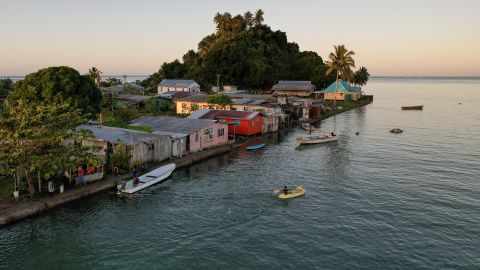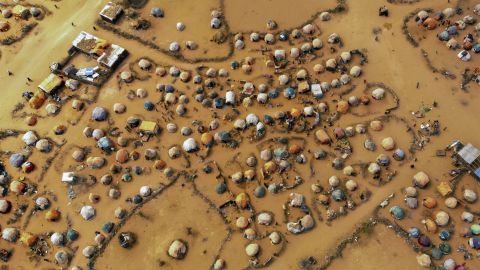CNN
—
Aftab Khan felt helpless as the torrents engulfed a third of his native Pakistan.
Khan’s hometown is completely underwater. His friend rescued a woman walking barefoot through 15 miles of stagnant floodwater with a sick child. Khan’s own mother, who now lives with him in Islamabad, was unable to return home on the washed-out road to check on her daughter’s safety.
“These are heart-wrenching stories, real stories,” Khan, an international climate change adviser, told CNN. “I’m very sad.”
Pakistan became the clearest example of why some countries are fighting for so-called “loss and damage” funds this year. The concept is that those countries that contribute the most to climate change through their global warming emissions should pay poorer countries to recover from the resulting disaster.
According to the World Meteorological Organization, Pakistan cooked through a deadly heatwave earlier this year, and climate change has made that 30-fold more likely. Now it is recovering from the aftermath of the worst flooding in living memory.
The South Asian country’s global warming emissions are less than 1 percent, but it has come at a heavy price. There are many other similar countries in the world.
Loss and damage will be at the center of this year’s COP27 in Sharm el-Sheikh, Egypt, as low-emitting countries flooded or watching islands sink into the ocean are demanding developed, high-emitting countries pay for the damage.
But it has been a contentious issue for years, as wealthy nations like the U.S. worry that agreeing to a loss and damage fund could expose them to legal liability and possible lawsuits in the future.
The developing-country climate activist and former senior U.S. climate official told CNN that time was running out, pointing to Pakistan’s cascading disaster as the clearest evidence of the need for a dedicated loss and damage fund.
Former White House climate adviser Gina McCarthy told CNN that developing countries are “not ready to protect themselves, adapt and adapt” to climate catastrophe. “It is the responsibility of the developed world to support this effort. Promises have been made, but not delivered.”
As a concept, loss and damage is the idea that rich countries that emit the most global-warming gases should pay poorer countries that are suffering from climate catastrophe that they did not cause.
Loss and damage is not a new problem. Developing countries and small island states have been vying for such funding since 1991, when the Pacific island of Vanuatu first proposed a scheme for high-emitting countries to focus funding on countries affected by rising sea levels.

It took more than a decade for the proposal to gain momentum, even as much of Vanuatu and other small Pacific island nations are slowly disappearing.
In Fiji, the home of climate activist Lavetanalagi Seru, more than $1 billion has been spent relocating families. Sirou, regional policy coordinator for the Pacific Islands Climate Action Network, said moving away from ancestral lands was not an easy decision, but climate change was having an irreversible impact on the islands.
“Climate change is threatening the social fabric of our Pacific communities,” Serou said. “That’s why these funds are needed. It’s a matter of justice for many small island developing States and countries in the Pacific, among others.”
One of the main reasons for the controversy surrounding this type of fund is that rich countries fear that paying for such a fund could be seen as an admission of liability, which could lead to legal battles. Developed countries like the United States have resisted it in the past and are still tiptoeing on the issue.
Khan said he understands why rich, developed countries are “lagging down.” But he added that “compassion and accountability are very important to them”.
There is also confusion over its definition – whether loss and damage is a liability, compensation or even compensation.
“‘Reparations’ is not a word or a term to use in this context,” U.S. climate envoy John Kerry said in a recent call with reporters. “We’ve always said that developed countries must help developing countries deal with climate impacts,” he added.

Kerry has pledged to hold talks on the fund this year ahead of a 2024 deadline to decide what the fund will look like. U.S. officials still have questions — whether through existing funding sources, such as the Green Climate Fund, or entirely new sources.
Kerry also sparked some controversy on the topic at a recent New York Times event where, in response to questions about loss and damage, Kerry appeared to imply that no country has enough money to help a place like Pakistan Recover from a devastating climate catastrophe.
“You tell me the governments of the world have trillions of dollars because that’s what it costs,” Kerry said at the event.
But others say the money is there. It’s more of a priority.
“Look at the annual defense budgets of developed countries. We can mobilize money,” E3G senior partner Alden Meyer told CNN. “It’s not a question of money. It’s a question of political will.”
At COP27, the biggest debate will be whether to create a dedicated financial mechanism for loss and damage – in addition to existing climate finance designed to help countries adapt to climate change and transition to clean energy.
It is likely to be on the official agenda at this year’s COP27 after climate-stricken countries called for a new loss and damage financing mechanism at COP26 in Glasgow last year. But even though rich nations like the US and EU countries have pledged to talk about it, there is not much hope that countries will come to an agreement on the fund from Sham.
“Are we expecting to get funding by the end of the fortnight? I hope, I’d love to — but we’ll see how the parties make it happen,” Egypt’s ambassador and the country’s leading climate negotiator, Mohammad Nasr, told recently. reporter.
But Nasr also tempered expectations, saying they were unlikely to make a breakthrough on financing mechanisms if countries were still haggling over whether to put loss and damage on the agenda.
He said the conversation on loss and damage was more likely to continue within Sharm’s fortnight, perhaps ending the framework established for the funding mechanism – or clarifying whether the funding came from new or existing sources.
Officials in some climate-vulnerable countries have warned that if countries fail to reach a deal now, the problems will get worse later.
“For countries that are not on the front lines, they think it’s a little bit of a distraction and people should focus on mitigating the problem,” Avinash Persod, a special envoy to Barbados Prime Minister Mia Motley, told CNN. “If we mitigate early enough, we don’t have to adapt, if we adapt early enough, we don’t lose losses. But we haven’t done those things yet.”